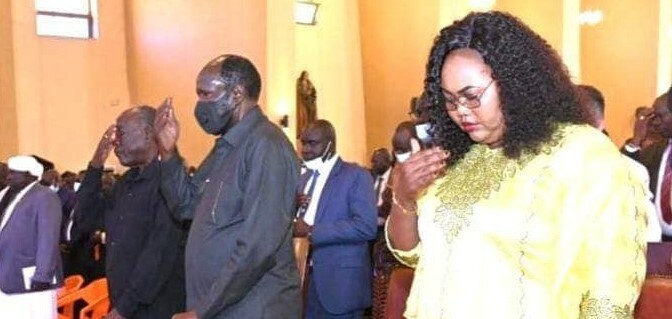South Sudan’s President Salva Kiir has resumed attending mass at St Theresa’s Cathedral in Juba after absenting himself for some time.
Addressing the mass congregation on Christmas Day at St Theresa’s Cathedral in Kator, President Kiir explained why he decided to absent himself from Church prayers every Sunday.
“I have been absent from the church for some time, not because I don’t want to pray in this church. But because there were elements in the Cathedral, whenever I come, they talk in a way that doesn’t encourage me to be here,” Kiir said, referring to church leaders.
Kiir, who is Catholic, further said: “But I have forgiven them.”
The South Sudanese leader pointed out that many people in the world hated the ruling SPLM party for taking the country back to war after liberating it from Sudan.
“You all know that I am the leader of the SPLM/SPLA. We fought the war of liberation with all our hearts and all our commitments until we liberated the country and we raised our flag,” he said.
“But, we in the SPLM/SPLA, who did well and brought freedom to people, we went back again and fought among ourselves, something that increased our suffering, and we been condemned by the whole world,” he added.
Kiir pointed out that the time wasted in fighting should have been used for development as the country lacks good roads to link the rural areas to the capital Juba. He further called on the citizens to concentrate on saving the lives of those affected by the floods instead of fighting over power.
Kiir forgives Machar
President Salva Kiir told the congregation that he has forgiven his peace partner First Vice President Riek Machar, whom he accused of fighting him for three decades.
“It will be up to him to apologize to the nation, or he doesn’t, but I have forgiven him. We are supposed to concentrate on the development of our country instead of a power struggle,” he said.
In September 2018, President Salva Kiir, who is Catholic, and opposition leader Riek Machar, a Presbyterian, signed a revitalized peace agreement and formed a transitional coalition government in February 2020. However, key provisions of the deal remain unimplemented.
On 4 August 2022, the parties to the peace agreement signed on to a further two-year extension of the unity government, postponing elections until late 2024.




